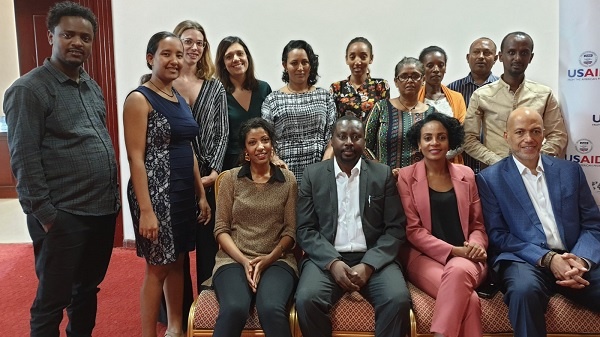
Violence against women in elections (VAW-E) has the potential to constrain significantly women’s ability to vote, run for office, access information and otherwise participate in the electoral process.
WASHINGTON, D.C. (NDI) – Ensuring accountable, transparent and inclusive elections in which women are free to participate equally is a cornerstone of any democratic system. Elections offer pivotal moments to strengthen women’s political participation and change the face of politics to better reflect a country’s citizenry. While Ethiopia has taken recent strides towards gender parity in high-level government positions, these gains have not yet translated into tangible improvements for women’s security and grassroots political participation. After a period of unprecedented civic opening, Ethiopia’s upcoming elections — postponed from August due to COVID-19 — provide an opportunity for the country to bolster the role of women in politics and society. Women have the potential to capitalize on expanding opportunities to hold elected office and to support their chosen policy platforms and candidates — but only if they are able to safely and equally engage in the electoral process.
While women remain under-represented at regional and local levels — and currently make up less than 40% of the National Assembly — Ethiopia has taken steps to increase gender parity in high-level government positions. When he took over in 2018, Prime Minister Abiy Ahmed committed to promoting broad inclusion of citizens’ views in Ethiopia. In his first year in office, he downsized the 34-person cabinet to 20, appointing women to half of those positions, nominated Meaza Ashenafi as the first female chief justice, and tapped Sahle-Work Zewde to become the first woman president. Prime Minister Abiy also appointed Birtukan Midesa — an exiled woman opposition leader who returned to Ethiopia under an amnesty arrangement in 2018 — to chair the National Election Board of Ethiopia (NEBE).
Nevertheless, women who have political aspirations are still all too often shut out of local and grassroots political processes due to traditional gender norms, and many become victims of violence, including psychological abuse (in person and online), economic violence, threats, physical and sexual assault because of their gender and political aspirations. USAID estimates as many as one in three women in Ethiopia already face physical, sexual or emotional violence. While more women are running for office in Ethiopia than ever before — 1,270 at federal and regional levels in 2015, compared to 927 five years prior — the Women’s Political Participation Risk Index scores Ethiopia at 119 out of 172 countries, one with an elevated risk for women who participate in politics. Moreover, development opportunities for women — including access to post-primary education, credit and financial resources and health care services — continue to lag behind those available to men.
Elections often see a spike in violence in general, and violence against women and girls in particular. Violence against women in elections (VAW-E), a specific type of Violence Against Women in Politics (VAW-P), has the potential to constrain significantly women’s ability to vote, run for office, access information and otherwise participate in the electoral process. VAW-E can be perpetrated within the home and by family members, preventing women from exercising their political rights as voters, elected officials, administrators, or observers. VAW-E is not only a grave threat to women who choose to raise their voices or exercise their civic rights. It also has a chilling effect on the potential of women at large and is a dangerous challenge to democracy itself.
Continue reading the full story on National Democratic Institute
